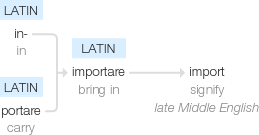Import
late Middle English (in the sense ‘signify’): from Latin importare ‘bring in’ (in medieval Latin ‘imply, mean, be of consequence’), from in- ‘in’ + portare ‘carry’.
wiktionary
From Middle English importen, from Old French emporter, importer, from Latin importō(“bring in from abroad, import”, verb), from in(“in, at, on; into”) + portō(“I carry, bear; convey”).
From Italian importare, and French importer, from Latin importō.
etymonline
import (v.)
early 15c., "signify, show, bear or convey in meaning," from Latin importare "bring in, convey, bring in from abroad," from assimilated form of in- "into, in" (from PIE root *en "in") + portare "to carry," from PIE root *per- (2) "to lead, pass over." In English, the sense of "bring from another state or land," especially "bring in goods from abroad" is recorded by 1540s. As "be important" from 1580s. Related: Imported; importing.
import (n.)
1580s, "consequence, importance;" 1680s, "that which is imported;" both from import (v.).
